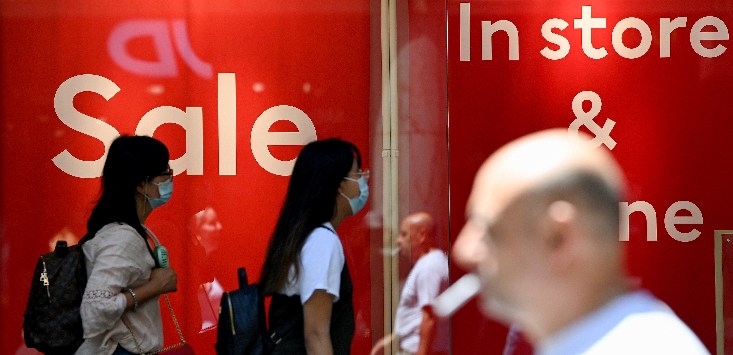
Source: Biancha De Marchi / AAP Image
I now pronounce you, shopper and store. Till’ death — or an unbeatable deal — do you part.
Declaring holy wedlock between consumer and retailer undoubtedly sounds farfetched, but in 2023 it is a binding sense of loyalty that is driving repeat business.
The relationship between brands and customers is beginning to bare more resemblance to a tight-knit relationship than a transactional affair. And this is something that retailers can capitalise on.
During the pandemic years, consumers became more purposeful shoppers, driven by practicalities such as lockdowns, social distancing and the convenience of e-commerce.
In 2023, this shift has strengthened in line with the growing forces of sustainability, economic uncertainty and improved tech tools.
Consumers are shopping cautiously, thoughtfully, and repetitively, spending on items from companies that align with their values and beliefs.
We are moving from the disposable economy to the circular economy — where one sees value in the goods they are purchasing beyond their initial ownership — driven by a concern about waste and sending goods to landfill.
Price, product assortment and convenience have historically been a focus for retailers when thinking about how to capture loyal, repeat customers.
While that’s not changing, factors like personalisation, sustainability and ethics are increasingly influencing which retailers and brands consumers pick.
Building emotional connections
There are many good examples of businesses helping to lay the blueprint for conscious retailing and reaping the rewards.
Fashion-tech company Citizen Wolf has adopted a made-to-order model using technology to deliver custom-sized clothing — an algorithm known as MagicFit.
Finding that perfect pair of jeans, only to discover the waistline is tighter than expected, is unquestionably one of the most wasteful and deflating shopping experiences.
Eliminating the guesswork not only increases customer satisfaction but it significantly reduces waste.
Pop-culture powerhouse Back to the Future famously — and erroneously — tipped that in modern times we’d be driving around in flying cars with ejection seats and that mailboxes would have their own fax machines; but it didn’t predict a tech algorithm determining our T-shirt size.
What has truly paid dividends for this company, however, is that it’s offering clothes ethically made to order.
Through a fashion lens, Australia has sadly claimed the mantle as one of the world’s leading contributors to textile waste, sending 800,000 tonnes to landfill each year.
Many shoppers are, at the very least, somewhat conscious of this. And the retailers that do their best to address this are making tremendous strides towards building union and rapport with their customers.
A Motisa report, ‘Leveraging the Value of Emotional Connection for Retailers’, found customers who feel an emotional connection to a brand are far more valuable to retailers, in some cases spending twice as much.
Additionally, these emotionally connected customers are 71% more likely to recommend the brand to others.
Subscribing, restoring and repairing
Another company bucking long-established fashion retail trends is GlamCorner, with its unique business model of renting designer dresses, selling preloved clothes and offering a wardrobe subscription plan, and delivering a monthly box of garments. This takes the current mega trend of subscription over ownership that we have seen prolific in movies (Netflix) and music (Spotify) extend to our fashion wardrobes.
Blockbuster Video would know all too well the old adage of ‘adapt or perish’. This certainly rings true at a time when brand loyalty is more important than ever before.
The importance of brand loyalty had been slowly simmering over recent decades, but then COVID-19 cranked up the heat.
The scope for innovation is now endless. And it doesn’t have to follow the traditional retail paradigms.
Department stores have always been a bellwether not only for the economy but an incubator for trends.
UK department store, Selfridges has launched a repair initiative, restoring pre-loved items to as good as new. It’s even taken it a step further, introducing repairs concierges across the UK. The truly remarkable part of this, you can book your collection from anywhere in the world.
The retailer even promises to bring your favourite shoes and bags back to their former glory. From removing tough stains to colour-restoring scuffs and scratches.
Luxury brands around the world are also starting to see the value in the circular economy. Rolex, for example, recently launched a certified pre-owned programme for its watches not only to capitalise on the multibillion-dollar second-hand market but to develop a deeper relationship with its loyal and aspiring customer base.
It goes without saying, but often the most suitable product is the tried and tested one that has already been a staple of your home or wardrobe for years. Being able to restore them to their former glory is a very appealing option for shoppers and can be lucrative for traditional retailers.
The widespread rollout of loyalty and incentive programs marked an ambitious first step in fostering the relationship between business and consumer. The next step is already being taken by trailblazing companies and I anticipate many more to come.
In retail, not dissimilar from life, there are plenty of fish in the sea. But shoppers are now inspired to find the right match. Think of marriage rather than an affair.
Paul Zahra is the CEO of the Australian Retailers Association.
Handpicked for you

The tennis stars serving up aces in the business world



COMMENTS
SmartCompany is committed to hosting lively discussions. Help us keep the conversation useful, interesting and welcoming. We aim to publish comments quickly in the interest of promoting robust conversation, but we’re a small team and we deploy filters to protect against legal risk. Occasionally your comment may be held up while it is being reviewed, but we’re working as fast as we can to keep the conversation rolling.
The SmartCompany comment section is members-only content. Please subscribe to leave a comment.
The SmartCompany comment section is members-only content. Please login to leave a comment.